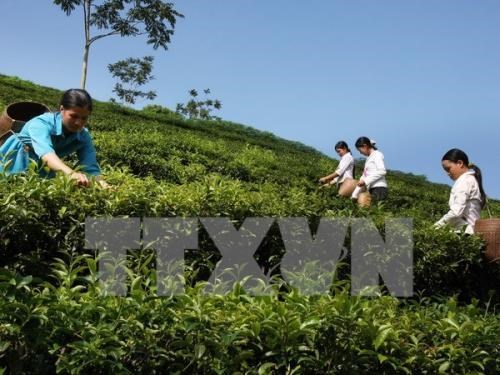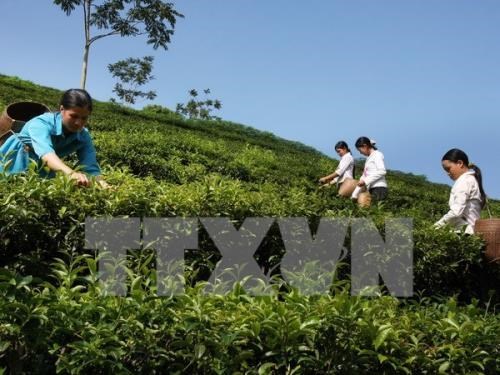
An organic tea production plant using the latest Japanese technology was inaugurated in Tan Lap commune, Bac Quang district, the northern mountainous province of Ha Giang on April 12.

Organic tea
cultivation in Ha Giang province (Photo: VNA)
The 4,500-square-metre plant was built at a total cost of more
than 30 billion VND (1.32 million USD) by Hoang Long Tea Co., Ltd. Equipped
with an automatic production line, the plant is capable of processing 40
billion tonnes of fresh tea per day, which helps consume material tea in Tan
Lap commune and other regions in the vicinity.
At the inauguration ceremony, Vice Secretary of the provincial Party Committee
Nguyen Manh Dung noted that tea is seen as a spearhead plant in the province’s
agricultural economic development plan.
Hoang Long company is one of the leading firms in developing tea material zones
and promoting connections with local farmers to ensure effective tea
cultivation, he said, urging the firm to continue its efforts to improve
product quality and income for tea growers.
Ha Giang province will direct branches and districts to zone off tea processing
areas to develop safe tea in line with organic standards, he stressed.
For his part, Director of Hoang Long Tea Co., Ltd Nguyen Duc Lai noted that the
company always pays attention to deploying technology in tea production to
bring clean and top-quality products to consumers.
The company’s black tea and green tea is favoured by both domestic and foreign
customers, he added.
Earlier in 2002, the company constructed a tea plant in Hung An commune, Bac
Quang district with total capacity of 50 billion tonnes of fresh tea per day.
Source: VNA
According to data from the Hoa Binh Provincial Party Committee, the industrial production index for the first six months of 2025 is estimated to have increased by 20% compared to the same period last year. This marks the highest year-on-year growth rate for this period since 2020.
In the first six months of 2025, Hoa Binh province’s export turnover was estimated at 1.145 billion USD, marking an 18.11% increase compared to the same period in 2024. Import turnover was estimated at $ 804 million, a 17.15% increase, which helped the province maintain a positive trade balance.
The lives of the ethnic minority farmers in Tan Lac district have gradually improved thanks to the new directions in agricultural production. This is a testament to the collective strength fostered through the professional associations and groups implemented by various levels of the district’s Farmers’ Union.
With the motto the "product quality comes first,” after nearly one year of establishment and operation, Muong village’s Clean Food Agricultural and Commercial Cooperative, located in Cau Hamlet, Hung Son Commune (Kim Boi district), has launched reputable, high-quality agricultural products to the market that are well-received by consumers. The products such as Muong village’s pork sausage, salt-cured chicken, and salt-cured pork hocks have gradually carved out a place in the market and they are on the path to obtaining the OCOP certification.
In the past, the phrase "bumper harvest, rock-bottom prices" was a familiar refrain for Vietnamese farmers engaged in fragmented, small-scale agriculture. But today, a new spirit is emerging across rural areas of Hoa Binh province - one of collaboration, organisation, and collective economic models that provide a stable foundation for production.
Maintaining growing area codes and packing facility codes in accordance with regulations is a mandatory requirement for agricultural products to be eligible for export. Recently, the Department of Agriculture and Environment of Hoa Binh province has intensified technical supervision of designated farming areas and packing facilities to safeguard the "green passport" that enables its products to access international markets.



